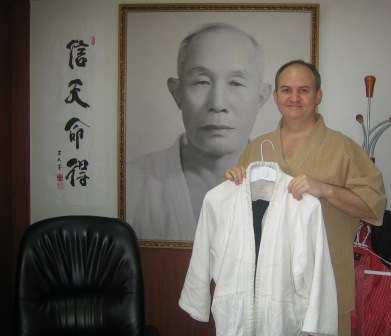|

"Hap Ki Do"
"Harmony, Energy, Way"
|
합 - Hap (Harmony) = Together or
the harmony of body and spirit.
기
- Ki (Energy) = Life and body energy.
도 -
Do (Way) = Way of life or way of
learning.
|
|
I studied the traditional Korean self-defense martial art known as
Hapkido during my visit to Korea. It was an amazing
experience. It helped change my inside and my outside.
I'd recommend it to anyone who's looking for a traditional style
martial art that anyone can learn. Learn more at
Hapkido-Info or
Wikipedia.
|
 |
 "Hwa Won Ryu"
"Influence, Circle, River"
|
 |
Three Principles of
Hapkido
1. Hwa (Influence) = The principle of influence.
By lightning fast
subtle movements, which hardly can be noticed, the aggressor is
arranged to reflex counter movements, which then are used in a
subsequent technique.
2. Won (Circle) =
The principle of the circle.
All movements are
circular. The Hapkido fighter moves as if he were inside a ball.
Influencing forces are rerouted from the outside and neutralized at
the surface of the "ball".
3. Ryu (River) = The
principle of the river.
Like the river,
which adapts extremely flexibly to the landscape and in the moment,
and with the buildup developing an enormous strength, the Hapkido
fighter also sensitively reacts to his opponent, in order to let his
pent-up "Ki" flow by the technique into the opponent at the crucial
moment.
|
 |
 |
After my red belt test
(04/24/07)
Gwan Jang Nim - Lee, Yong He
(8th Dan main teacher)
Sa Bum Nim - Joo, Sang Chul
(3rd Dan assistant teacher) |
Chang Moo Gwan
The dojang where I studied in
Daegu, South Korea. |
 |
My last night in Korea
April 26, 2007 |

Choi, Yong Sul (1904-1986)
The Founder of Hapkido

My Gwan Jang Nim and I
visited his grave on April 20, 2007.
Click here for more info
and my Hapkido Family Tree
|










